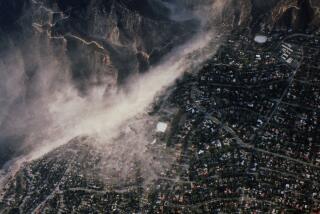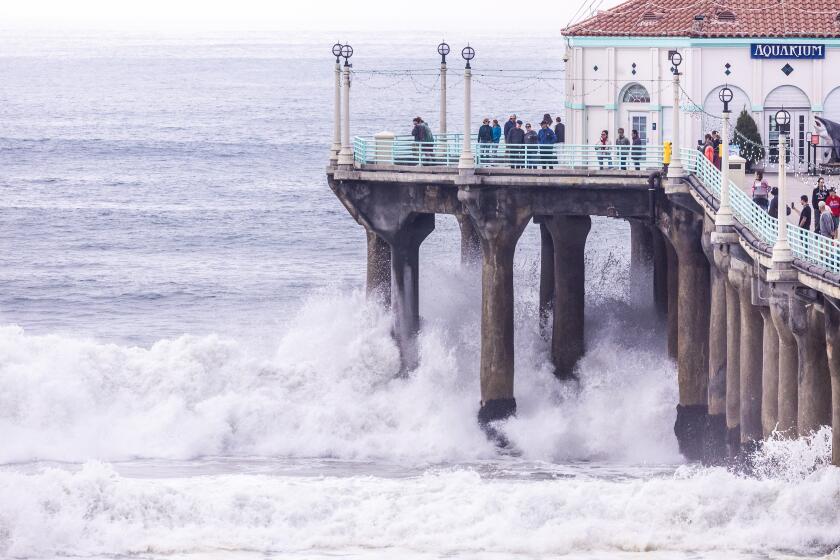911 System Crashes; Computer Is Blamed
The Los Angeles city emergency 911 telephone system crashed twice Saturday afternoon--once for 45 minutes--according to officials, who blamed the breakdown on a computer malfunction.
For four hours, the system was only partly functioning as Pacific Bell engineers worked to repair computers at the Police Department’s central dispatch center in the basement of City Hall East, said Sgt. John Emerson of the department’s Communications Division. Officials reported that the problems were fixed by 5:15 p.m.
Police said they were not aware of any emergency that went unanswered, but some of the Police Department’s stations reported an increase in calls as people unable to get through to 911 operators called them directly.
Crashed a Second Time
Operators first discovered the phone lines out about 1 p.m., Emerson said. Pacific Bell engineers restored parts of the system five minutes later, he said, but at 3 p.m the system crashed again. A backup system also failed, stopping all emergency calls for 45 minutes.
“Our computer has gone belly-up all over the place,” Emerson said. “This has never happened to us in the 911 system.”
Pacific Bell officials said that four out of five callers who were unable to get through to 911 operators were getting a recorded message. They said the shutdown was caused by a power failure in the computer’s signaling mechanism.
A similar but shorter blackout occurred Feb. 16, 1987; that one-hour outage was also blamed on a power failure.
Engineers once again succeeded in restoring the system’s phone lines at 3:45, Emerson said. But the system’s computers were still not working by late afternoon and the 25 operators at the dispatch center were forced to process calls manually, Emerson said.
Computers normally display the address and phone number of the person making the emergency call. With the computers down, the operators had to transfer calls by hand. “It’s been so long since we’ve used this old (manual) system,” Emerson said. “We’ve just stepped back 15 years.”
Operators at the center receive about 200 calls per hour and relay them to police and fire stations. Even after the phone lines were restored, operators were having difficulty transfering the calls to Fire Department dispatchers, Emerson said.
Emerson said that although people making calls to the emergency number might be placed on hold for a few seconds longer, all calls were being answered by late Saturday. “If people aren’t calling in too much, we’ll be OK,” he said.
At some Police Department stations, officers noticed an increase in emergency calls.
“To tell you the truth, no one officially told us why we were getting them,” said Officer Tony Rivera of the Wilshire Station. “A few people told us that they called 911 and were put on hold for . . . (an) unbelievable time.”
Calls made to police at the Hollenbeck Station were relayed by radio to dispatchers at City Hall, said Officer William Malin. “Everything was screwed up, but it worked all right,” he said.
Police in the field monitored the radio transmissions so that units that were close to the site of the emergency could let dispatchers know that they were available, Malin said.
Twice during the afternoon, Police and Fire Department officials released the numbers of nine police and fire stations to call instead of 911 in emergencies.
Jim Wells, a spokesman for the Los Angeles City Fire Deparment, explained that although by late afternoon calls were getting through to 911 dispatchers, the alternative numbers were provided as a “precautionary measure” in case the system broke down again.
Lt. Ron Young of the Northeast Station said it was fortunate that the breakdown occurred Saturday afternoon, during a quiet part of the weekend.
“Things really haven’t gotten rolling yet. This is the calm before the storm on the weekends,” he said.
The computerized 911 system was installed in Los Angeles in 1983. Located four floors below ground level, it is designed to withstand a major earthquake.
“It’s a very good system,” said Pacific Bell spokeswoman Lisa Zanville.
The majority of calls received by the system operators are not emergencies and are transferred to radio dispatchers who assign patrol cars according to priority and availability. In life-threatening situations, however, operators immediately dispatch the caller’s location to patrol cars.
Staff writers Eric Malnic and Carol McGraw contributed to this article.
More to Read
Sign up for Essential California
The most important California stories and recommendations in your inbox every morning.
You may occasionally receive promotional content from the Los Angeles Times.











